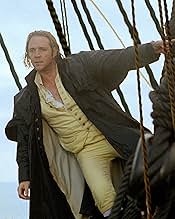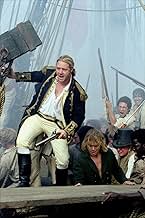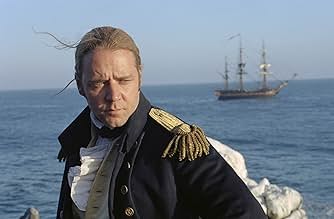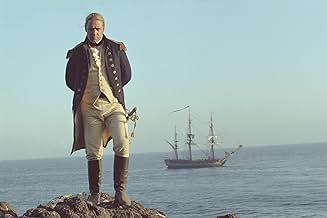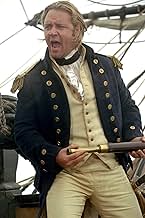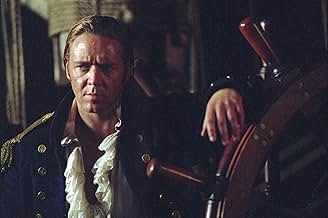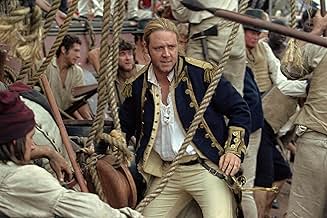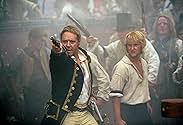Master and Commander : De l'autre côté du monde
Titre original : Master and Commander: The Far Side of the World
Pendant les guerres napoléoniennes, un capitaine britannique impétueux pousse son bateau et son équipage à bout à la poursuite d'un formidable navire de guerre français en Amérique du Sud.Pendant les guerres napoléoniennes, un capitaine britannique impétueux pousse son bateau et son équipage à bout à la poursuite d'un formidable navire de guerre français en Amérique du Sud.Pendant les guerres napoléoniennes, un capitaine britannique impétueux pousse son bateau et son équipage à bout à la poursuite d'un formidable navire de guerre français en Amérique du Sud.
- Réalisation
- Scénario
- Casting principal
- Récompensé par 2 Oscars
- 23 victoires et 90 nominations au total
Avis à la une
"Master and Commander: The Far Side of the World" is a very unusual film because the filmmakers obviously were not attempting to make yet another Hollywood style blockbuster. Instead, they seemed to be doing the impossible--make a film that tries very hard to replicate what life was like at sea back during the Napoleonic Wars. As a retired history teacher, this is the sort of stuff I love--even if in the original, the 'bad guys' were actually the Americans and it was set during the War of 1812! I assume they changed the enemy to the French to make the film more marketable. After all, it would be a hard sell in the large American market to get the audiences to root for the British Navy in this altercation! The story occurs around the beginning of the 19th century. The Brits and French have been fighting off and on for almost a decade (and would continue to do so until 1815). The action is set aboard a British Naval ship commanded by Captain Jack Aubrey (Russell Crowe). His ship has encountered a larger and faster French vessel and managed to escape. However, instead of running, Crowe plays a very determined man--and spends much of the film hunting down this ship. Along the way, there are lots of adventures--mostly of the variety you might actually have seen during the era. I could talk about them, but frankly this would spoil the suspense.
Overall, while this film is very slowly and deliberately paced (which will obviously turn off some viewers), the film is so expertly crafted that for a reasonably patient viewer, it should be a very engaging film. The film looks great--with a lot of attention to details and accuracy. It also has the best looking sea footage you can find in a period film--especially when the ship is rounding the Cape (it must have been amazing on the big screen). The acting is lovely as well--understated but quite realistic. Well done in every way and the director really deserves kudos for this one. While I love films from the same period as "Damn the Defiant", "Captain Horatio Hornblower", "Mutiny on the Bounty" and the like, clearly "Master and Commander" is superior when it comes to accurately portraying the life of a seaman.
Overall, while this film is very slowly and deliberately paced (which will obviously turn off some viewers), the film is so expertly crafted that for a reasonably patient viewer, it should be a very engaging film. The film looks great--with a lot of attention to details and accuracy. It also has the best looking sea footage you can find in a period film--especially when the ship is rounding the Cape (it must have been amazing on the big screen). The acting is lovely as well--understated but quite realistic. Well done in every way and the director really deserves kudos for this one. While I love films from the same period as "Damn the Defiant", "Captain Horatio Hornblower", "Mutiny on the Bounty" and the like, clearly "Master and Commander" is superior when it comes to accurately portraying the life of a seaman.
Epic. It is the first word defining it. But , scene by scene, the nuances are more significant. For a lot of reasons. The performances could be the first. And the most seductive. The memories about adventure and historical literature from. early years is the second. Not the last - the thrill of story, remembering huge drama. And the art of a real good adaptation.
The British Navy ruled the waves throughout the nineteenth century and this film captures some of that spirit rather well. The cast is excellent, Crowe in particular shining as the captain. The battle scenes between Anglo-French vessels are very entertaining, the cannons blasting great big holes into enemy ships! The story itself is not going to set the world on fire, but its all done very nicely. The film offers a glimpse of what life at sea was like during the Napoleonic Wars and anybody with an interest in history should catch the film. A few more battles would have been nice, but there you go! It's over 2 hours long, but doesn't drag. One to watch definitely.
"Master and Commander: The Far Side of the World" is half swashbuckling action movie, half detailed examination of life in the 19th-century British navy, and all entertaining. Director Peter Weir has created an intriguing film that nicely balances fierce battle sequences with quiet, intimate scenes.
Nearly all of the film takes place aboard the HMS Surprise, under the command of Captain "Lucky" Jack Aubrey (Russell Crowe). The captain's orders: to intercept and disable the French privateer Acheron, which is troubling British vessels off the coast of South America. The two ships clash early on, and the Surprise is thoroughly routed--the Acheron is larger, faster, and more modern. But Aubrey, with a determination that might not entirely be due to his sense of duty, is not one to give up, and the Surprise chases the Acheron--and/or vice versa--down the Brazilian coast, around Cape Horn, and to the Gallapagos Islands.
That's the action part. The intimate part involves Aubrey's relationship with the ship's surgeon, Stephan Marutin (Paul Bettany). Stephan is a quiet intellectual and devout naturallist, whose train of thought is foraying into the territory that would make Darwin a household name later in the century. He's also the only one among the crew who's either willing or able to call Aubrey's decisions into question. He provides a grounding force for the captain, and the friendship between these two dissimilar men is the emotional heart of the story.
I've yet to read any of the Patrick O'Brian series upon which "Master and Commander" is based, but the movie shows every evidence of being derived from a painstakingly and meticulously detailed work, one which has gone to great lengths to re-create the world and environment of these men. The details on screen are wonderful, depicting the sort of harsh conditions that make the contestants on those "reality" series look like the overglorified wimps they are. The crew of the Surprise (many of them not older than twenty) lives in claustrophobic and none-too-clean quarters--at times it seems as if every inch of the screen is crammed full--and sleep in hammocks that may very well end up serving as their shrouds. Battles are chaotic, with cannon fire ripping huge holes in the ship and sending shrapnel in every direction. The weather seems to exist only in extremes: still heat, raging tempests, even snow as they drift down near the Antarctic circle. Good service is rewarded with extra rations of grog and brandy, insubordination is punished by the whip. It's a place where both close friendships and deep resentments can grow, and the tension in the air at times feels like a living presence.
Crowe dominates the production, once again proving himself one of the best leading men working in movies. In his hands, Jack Aubrey is a natural leader of men: clever, courageous, determined, and capable of what nowadays is called "thinking outside the box." He is frequently confronted with difficult choices, but takes his responsibilities and the consequences of his actions unflinchingly. Bettany turns in an equally good performance as Aubrey's emotional and ideological opposite; the two men play wonderfully off of each other. Most of the rest of the crew tends to blur together (the exceptions include a young officer who's right arm gets amputated early on, and later takes command of the ship), but "Lord of the Rings" fans will be amused to notice Billy Boyd among the ranks.
The combination of action and introspection in "Master and Commander" at times seems like an odd mix, but the film succeeds on both levels. Definitely a voyage worth taking.
Nearly all of the film takes place aboard the HMS Surprise, under the command of Captain "Lucky" Jack Aubrey (Russell Crowe). The captain's orders: to intercept and disable the French privateer Acheron, which is troubling British vessels off the coast of South America. The two ships clash early on, and the Surprise is thoroughly routed--the Acheron is larger, faster, and more modern. But Aubrey, with a determination that might not entirely be due to his sense of duty, is not one to give up, and the Surprise chases the Acheron--and/or vice versa--down the Brazilian coast, around Cape Horn, and to the Gallapagos Islands.
That's the action part. The intimate part involves Aubrey's relationship with the ship's surgeon, Stephan Marutin (Paul Bettany). Stephan is a quiet intellectual and devout naturallist, whose train of thought is foraying into the territory that would make Darwin a household name later in the century. He's also the only one among the crew who's either willing or able to call Aubrey's decisions into question. He provides a grounding force for the captain, and the friendship between these two dissimilar men is the emotional heart of the story.
I've yet to read any of the Patrick O'Brian series upon which "Master and Commander" is based, but the movie shows every evidence of being derived from a painstakingly and meticulously detailed work, one which has gone to great lengths to re-create the world and environment of these men. The details on screen are wonderful, depicting the sort of harsh conditions that make the contestants on those "reality" series look like the overglorified wimps they are. The crew of the Surprise (many of them not older than twenty) lives in claustrophobic and none-too-clean quarters--at times it seems as if every inch of the screen is crammed full--and sleep in hammocks that may very well end up serving as their shrouds. Battles are chaotic, with cannon fire ripping huge holes in the ship and sending shrapnel in every direction. The weather seems to exist only in extremes: still heat, raging tempests, even snow as they drift down near the Antarctic circle. Good service is rewarded with extra rations of grog and brandy, insubordination is punished by the whip. It's a place where both close friendships and deep resentments can grow, and the tension in the air at times feels like a living presence.
Crowe dominates the production, once again proving himself one of the best leading men working in movies. In his hands, Jack Aubrey is a natural leader of men: clever, courageous, determined, and capable of what nowadays is called "thinking outside the box." He is frequently confronted with difficult choices, but takes his responsibilities and the consequences of his actions unflinchingly. Bettany turns in an equally good performance as Aubrey's emotional and ideological opposite; the two men play wonderfully off of each other. Most of the rest of the crew tends to blur together (the exceptions include a young officer who's right arm gets amputated early on, and later takes command of the ship), but "Lord of the Rings" fans will be amused to notice Billy Boyd among the ranks.
The combination of action and introspection in "Master and Commander" at times seems like an odd mix, but the film succeeds on both levels. Definitely a voyage worth taking.
In April 1805, Napoleon rules Europe. British frigate H.M.S. Surprise under the command of Captain Jack Aubrey (Russell Crowe) is ordered to intercept French Privateer Acheron. In the first battle, Aubrey quickly discovers that Acheron is actually bigger, faster and more powerful skippered by a smart tactician. He escapes only through his skills and experience. After being soundly beaten, Aubrey decides to keep going instead of returning to base to refit. The ship's surgeon and Aubrey's friend Dr. Stephen Maturin (Paul Bettany) clash with him more and more as the far ranging battle continues.
The action is exciting and more realistic than sail seafaring battle movies before it. The most compelling are the splinters that fly everywhere. It is the CGI that pushes the envelop on this action. Realism is everywhere. It is dirty, ugly, bloody, and horrifying. Russell Crowe delivers a solid performance to anchor this movie in reality. Then there are the everyday things that happen in between the battles. This has the epic scale conflicts but the human size struggle.
The action is exciting and more realistic than sail seafaring battle movies before it. The most compelling are the splinters that fly everywhere. It is the CGI that pushes the envelop on this action. Realism is everywhere. It is dirty, ugly, bloody, and horrifying. Russell Crowe delivers a solid performance to anchor this movie in reality. Then there are the everyday things that happen in between the battles. This has the epic scale conflicts but the human size struggle.
Le saviez-vous
- AnecdotesRussell Crowe learned to play violin for the film and referred to it as the hardest thing he'd ever done for a film.
- GaffesDuring the Storm when the Surprise is chasing the Acheron around Cape Horn, Barrett Bonden is shown alone at the wheel. It was customary on a Royal Navy vessel of the time to always have at least two men at the wheel both as a security measure in case one man was injured in battle, and because the rudder itself was extremely heavy and difficult to turn. During any sort of heavy weather there would certainly have been four or more men at the wheel as one man would not be able to control the rudder (which is why the ship has two connected wheels).
- Citations
[Toasting]
Capt. Jack Aubrey: To wives and sweethearts.
Officers: To wives and sweethearts.
Capt. Jack Aubrey: May they never meet.
- Crédits fousThere are no opening credits.
- ConnexionsEdited into Spisok korabley (2008)
- Bandes originalesGhost of Time
Composed by Iva Davies, Christopher Gordon and Richard Tognetti
Performed by Iva Davies and Icehouse
Featured Violin Performance by Richard Tognetti
Orchestrated by Christopher Gordon
Meilleurs choix
Connectez-vous pour évaluer et suivre la liste de favoris afin de recevoir des recommandations personnalisées
- How long is Master and Commander: The Far Side of the World?Alimenté par Alexa
Détails
- Date de sortie
- Pays d’origine
- Sites officiels
- Langues
- Aussi connu sous le nom de
- Capitán de mar y guerra: La costa más lejana del mundo
- Lieux de tournage
- Sociétés de production
- Voir plus de crédits d'entreprise sur IMDbPro
Box-office
- Budget
- 150 000 000 $US (estimé)
- Montant brut aux États-Unis et au Canada
- 93 927 920 $US
- Week-end de sortie aux États-Unis et au Canada
- 25 105 990 $US
- 16 nov. 2003
- Montant brut mondial
- 211 623 421 $US
- Durée
- 2h 18min(138 min)
- Couleur
- Mixage
- Rapport de forme
- 2.39 : 1
Contribuer à cette page
Suggérer une modification ou ajouter du contenu manquant







